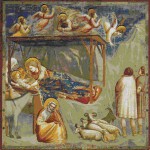 “Oh sing to the Lord a new song, for he has done marvellous things.” — Psalm 98:1
“Oh sing to the Lord a new song, for he has done marvellous things.” — Psalm 98:1
Psalm 98 is a remarkable Psalm, and according to an ancient Christian tradition, it is a Christmas Psalm, an Old Testament text that is appropriate for reading at this time of year.
What’s Christmassy about it, you might ask. Read through it: there are no shepherds or wise men, no virgin birth or prophecies of the coming of the Messiah in Bethlehem, as we can find plentifully in other passages of the Old Testament. So why read Psalm 98 in the time of advent leading up to Christmas? Why spend precious advent time looking into Psalm 98?
Why? It’s always important to know why we do what we do, especially during a season like this when we’re all behaving oddly according to customs we grew up with. My wife and I took our kids to the store a few weeks ago to buy a Christmas tree, and all along the way, the little elves kept up the questions:
Why are we going to put a tree inside our house?
Why is that man using a chain saw to cut the end off the tree?
What does this have to do with baby Jesus?
Why did you yell at that man who changed lanes?
Why do we put decorations on the tree?
Why are we hanging colored lights all over the outside of our house?
Why don’t we hang a lot more colored lights?
Why, why, why? Deuteronomy tells us that these why why why questions can be used for teaching what’s most important: Deut 6:20 says, “When your son asks you in time to come, ‘What is the meaning of the testimonies and the statutes and the rules that the Lord our God has commanded you,’ then you shall say to your son, ‘We were Pharaoh’s slaves in Egypt, and the Lord brought us out with a mighty hand and the Lord showed signs and wonders, great and grievous, against Egypt… before our eyes.”
Now that’s what you call a learning opportunity, an object lesson. Every now and then we manage to provide reasons like that for something: I scored good points this season in response to the question, “What’s an advent calendar,” by saying that “advent” means “arrival,” or “coming,” and that an advent calendar is a way of counting down the days until the arrival of Jesus’ birthday. I wish I’d gone on to explain a little more about the arrival of Jesus the Messiah, but I figured “advent” means “arrival” is enough progress on that front for one season.
I wish I had reasons like that for all the weird things we do, and see, and eat, and sing at Christmas, but some of the things we do have reasons like
“grandma always made this dish,” or
“we got it because it was on sale,”
or “that would make sense if we lived somewhere where it snowed,”
or “once a year, Americans like to pretend they’re from old Germany,”
or even, “I’m sorry kids, but I can’t give you any good reason why Rudolph the Red-Nosed Reindeer and Frosty the Snowman are in that nativity scene.”
In fact, the whole Christmas season is an annual puzzle that pushes us for a good explanation. Every Christmas show from Charlie Brown to the Grinch is some version, more or less secularized, of the quest for the true meaning of Christmas, of the reason for the season, of why why why.
So why Psalm 98 for Christmas? More on that soon.